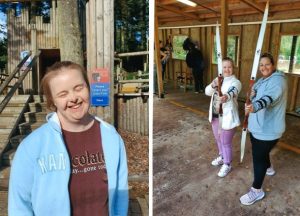2023-03-03 16:59:41
From Centre Parcs to beach visits – a day in the life of a support worker
Social care is often surrounded by a great deal of stigma; people are unsure about what support workers do and how they do it. However, this National Careers Week, support worker Lisa Dunstan is hoping to encourage others to consider a career in social care as she shares exactly what a day in the life of a support worker entails.
Lisa is a support worker for national learning disability charity Hft in St Austell, Cornwall. She stepped into the role four years ago after leaving her job as a chef as she wanted something less physical but equally rewarding.
Speaking about her role and what it entails day to day, Lisa says:
“I am both a support worker and a key worker for a woman with a learning disability. This means each day can be different from the next. One day I might be working for 12 hours with just one person, or I could be working with three or four across the day.
“On a typical day I will assist with getting the person I’m supporting ready for the day and finding out what they would like to do. This could be anything from going out for lunch, going for a walk, visiting the beach, going shopping or we can simply stay inside and watch a film or do some tidying. And if the person I’m supporting lacks capacity or is mute, I offer support by showing photos so they can choose what they would like to do.
“Everything we do is person-centred and my job is really to enable the person I’m supporting to do what they want to do and make things happen for them.

“The best part of this job for me is watching someone achieve something that they didn’t think they could do. A lot of the time, people just need your support to build up their confidence. This is something I saw a lot of post-Covid. It took months to get one of the people I support out of her flat for anything other than a walk but, after assuring her it was safe and taking precautions like wearing a mask, she got back out in the community and it’s great to see her getting enjoyment out of going outside again.
“Another memory I can’t not mention is when we took two supported people to Centre Parcs in 2021. It was such an amazing break for them. At first, one of them was very timid but as soon as she arrived she put herself out of her comfort zone and tried everything. She learnt how to do archery, went on a boat at Longleat, and to pitch and putt which she won! She learned a lot about herself and it was a really special week.”

Lisa admits that not every day is challenge-free and that, with the changing nature of her job, one day can be so different from the next.
She continues, “There are challenging days but the good days outweigh the bad. You accept that everyone can have a bad day but that the next day will be different. And, when you are part of a really good team, you help your colleagues through their bad days and they help you through yours. We have a really lovely team here and everyone is so passionate about their role.
“I would absolutely encourage others looking for work to consider looking at support worker roles. Social care gets some bad press but it is very rewarding. I’ve had a really good experience at Hft – the training and management have been really great. And getting out and about is amazing. I’ve definitely seen more of Cornwall in the last four years than I have living here my whole life!
“My only regret is not doing this sooner!”
If you are interested in a career supporting people with learning disabilities to live the best life possible, visit hft.org.uk/jobs.
Notes to editors
For further information please email media.enquiries@hft.org.uk
About Hft
Proudly established in 1962 by a group of visionary parents, Hft is a charity supporting more than 2,500 learning disabled adults in England and Wales. Together, we are creating a future where learning disabled people and their families can live the best life possible.
Providing personalised support. Creating solutions for living independently. Coming together to campaign for positive change. Fundraising for new opportunities and a bigger impact.
In 2033, we’ll live in a world where learning disabled people have greater choice. About where they live. The support they need and want. And how to spend their time and money.
Learning disability versus difficulty
A learning disability is different from a learning difficulty but the terms are often confused and used inter-changeably. A learning difficulty does not affect general intellect, whereas a learning disability is a life-long condition characterised by a reduced intellectual ability and struggle with everyday activities.
–
For more information about Hft please visit www.hft.org.uk





